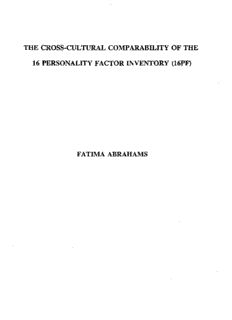Table Of ContentTHE CROSS-CULTURAL COMPARABILITY OF THE
16 PERSONALITY FACTOR INVENTORY (16PF)
FATIMA ABRAHAMS
THE CROSS-CULTURAL COMPARABILITY OF TIIE 16
PERSONALITY FACTOR INVENTORY (16PF)
by
FATIMA ABRAHAMS
submitted in accordance with the requirements
for the degree of
DOCTOR OF COMMERCE
in the subject
INDUSTRIAL PSYCHOLOGY
at the
UNIVERSITY OF SOUTH AFRICA
PROMOTER: PROF K F MAUER
30 NOVEMBER 1996
IBIS IBESIS IS DEDICATED TO MY PARENTS, ACHMAT AND WARALDIA
GYDIEN, MY HUSBAND, RAMZIE AND MY DAUGHTERS, ZAREEN AND
MISHKAH.
UN ISA
BIBUOTEEK I LIBRARY
,
rn~d-04- 1
Class
Klas .. 155. 283 ABRA
Ace es
Aanwi1 ...... .
llHHlmHllll
0001698820
Student number: 3004-475-8
I declare that The cross-cultural comparability of the 16 Personality Factor Inventory
(16PF) is my own work and all that I have used or quoted have been indicated and
acknowledged by means of complete references.
SIGNATURE DATE
(MRS) F ABRAHAMS
ACKNOWLEDGEMENTS
All praises are due to the Creator who granted me the ability to tackle and complete this
thesis.
I would also like to thank all the people who supported me throughout the process,
particularly:
Prof. K F Mauer, my supervisor, for his suggestions and inputs about the thesis in
general, his critical comments of the draft chapters, and his constant willingness to
support me throughout the entire process.
Prof. Micheal Muller and Ms. Evelyn Muller for their advice and help with
conducting the statistical analysis.
My brother Ziyaad, for his continual support and for acting as my research assistant,
who spent many hours coding and punching the data.
The staff of the Psychology and/or Industrial Psychology Departments at the
University of Durban-Westville, University of Pretoria, and University of Natal who
so willingly spent time helping me with the administration of the test.
All the students who participated in the study, particularly my honours students of
1996.
The staff of the department of Industrial Psychology, UWC, for their constant
encouragement and support.
My parents, Achmat and Waraldia Gydien who made many sacrifices throughout their
lives to give me an education and who supported me emotionally and physically
whilst busy with this thesis.
My husband Ramzie, whose support and encouragement was invaluable during this
period, and who made valuable comments about my research.
My daughters, Mishkah and Zareen, who inspire me continually and who love me
unconditionally.
And last, but not least, my brothers Sedick and Riad, who supported and encouraged
me continually, even though we argued over many issues over the years, as sibling
often do.
Finally, the financial assistance of the Centre for Science Development towards this research
is acknowledged. Opinions expressed in this thesis and conclusions arrived at, are those of
the author and are not necessarily to be attributed to the Centre for Science Development.
TABLE OF CONTENTS
Page
LIST OF TABLES viii
LIST OF FIGURES XlV
SUMMARY xvi
CHAPI'ER 1
INTRODUCTION 1
1.1 Background 1
1.2 Importance of Research 5
1.3 Aims 8
1.4 Conclusion 9
CHAPI'ER 2
CROSS-CULTURAL PSYCHOWGY 10
2.1 Introduction 10
2.2 Cross-cultural Psychology 10
2.3 Goals of cross-cultural psychology 13
2.4 Relationships with other disciplines 15
2.4.1 Historical development 16
2.4.2 Cross-cultural psychology in South Africa 20
2.4.3 Academic interest in cross-cultural psychology 25
2.5 Etic-Emic Distinction 27
2.6 Ethnocentrism of psychology 29
11
2.7 Culture and ethnicity 35
2.7.1 Culture 35
2.7.2 Ethnicity 37
2.8 Conclusion 39
CHAPTER 3
COMPARABILITY OF PERSONALITY TESTS 40
3.1 Introduction 40
3.2 Comparability 42
3.2.1 The logic of comparability 42
3.2.2 Defining comparability 44
3.3 Bias 48
3.3.1 Bias in predictive validity 49
3.3.2 Bias in construct validity 51
3.3.3 Bias in content validity 52
3.4 Relationship between comparability and bias 56
3.5 Research on the cross-cultural comparability
of personality tests 57
3.5.1 Cross-cultural research on the 16PF 64
3.5.2 Cross-cultural research on personality tests in
South Africa 69
3.6 Conclusion 71
Ill
CHAYfER 4
CATTELL'S FACTOR THEORY 72
4.1 Introduction 72
4.2 Trait Theorists 73
4.2.1 Allport 73
4.2.2 Guilford 75
4.2.3 Eysenck 76
4.3 Cattell' s Factor Theory 78
4.3.1 Definition of Personality 79
4.3.2 Structure of Personalty 82
4.3.2.1 Classification of traits 82
4.3.2.2 Dynamic structure 87
4.3.2.3 The dynamic lattice 91
4.3.2.4 Conflict and the specification equation 92
4.3.3 Research methodology 93
4.3.3.1 Sources of data 93
4.3.3.2 Basic techniques in factor analytic methods 97
4.3.4 Stages of Personality Development 100
4.3.5 Heredity-Environment Research and Learning 103
4.3.6 Evaluation of Cattell's theory 105
4.4 Conclusion 109
iv
CHAPTERS
STATEMENT OF PROBLEM AND HYPOTHESIS 110
5.1 Introduction 110
5.2 Hypotheses 112
CHAPTER 6
RESEARCH DESIGN 118
6.1 Sample 118
6.2 Measuring Instruments 128
6.2.1 The 16 Personality Factor Questionnaire (16PF) 128
6.2.1.1 The uses of the 16PF 132
6.2.1.2 Interpreting the 16PF 133
6.2.1.2.1 First-order factors 134
6.2.1.2.2 Second-order factors 165
6.2.1.2.3 Third-order factors 169
6.2.1.3 Evaluation of the 16PF 170
6.2.1.4 The 16PF in South Africa 175
6.2.1.4.1 The 16 Personality factor Questionnaire, South African 1992
version (16PF SA92) 177
6.2.2 Biographical Questionnaire 183
6.3 Procedure 187
6.4 Methods and techniques 187
6.5 Conclusion 188
Description:16 Personality Factor Inventory (16PF); Cattell; Personality questionnaire; Cross-cultural;. Comparability The Sixteen Personality Factor Questionnaire (16PF) is an objective paper-and-pencil test designed to c (hotel management) but more whites endorsed this option than blacks. Only 28 % of the.

